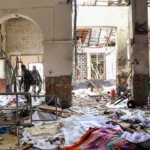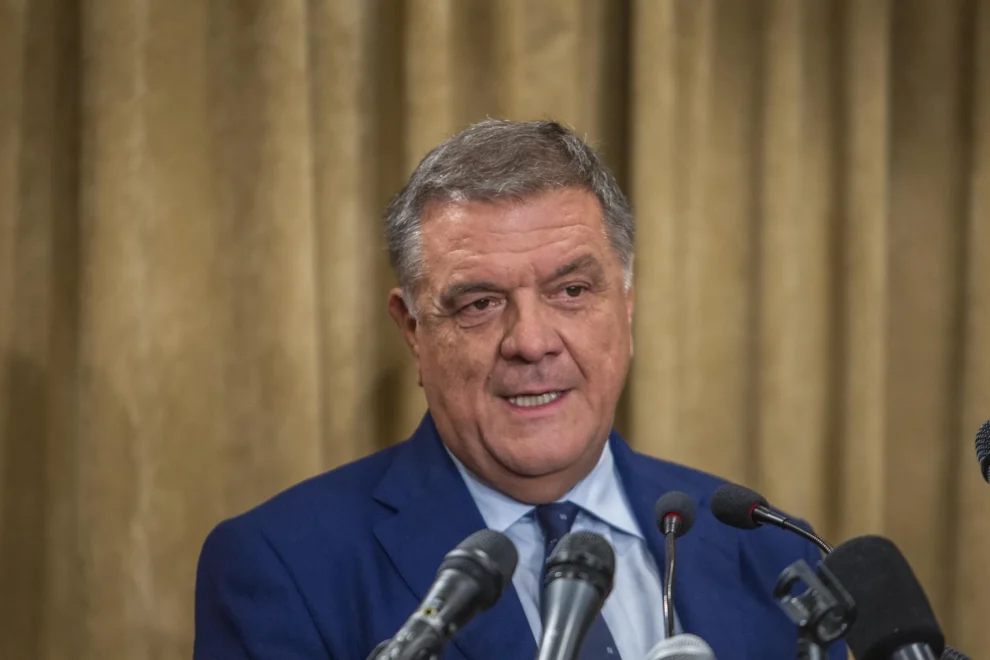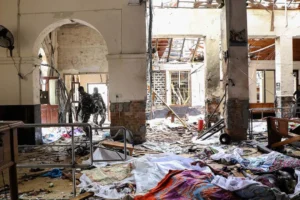Federica Mogherini and Bernard Cazeneuve were on the board of Panzeri’s human rights campaign. Now they’ve quit and he’s in jail.
It was one of the best-connected human rights groups in Brussels, boasting an office a few meters from the British ambassador’s residence and a clutch of top names on its board.
Now it is at the center of an alleged corruption scandal engulfing the European Parliament; those leading patrons have quit and even its own name plate has been removed from the door.
Fight Impunity was founded in 2019 by Pier Antonio Panzeri, a former MEP, to promote the cause of human rights and to bring violators to justice.
Panzeri and a Fight Impunity and parliamentary staffer, Francesco Giorgi, are both now in custody. So is Giorgi’s Greek MEP girlfriend, Eva Kaili.
Niccolò Figà-Talamanca, the secretary general of the NGO No Peace Without Justice, which shares the office address on Rue Ducale with Fight Impunity, has been released with an electronic tag, prosecutors said.
In all, police have seized €1.5 million in cash in at least 20 raids on homes, offices and hotel rooms across Belgium, France and Italy as part of an inquiry into alleged corruption and money laundering, apparently involving representatives of Qatar.
On Monday, another of those arrested as part of the probe, International Trade Union Confederation General Secretary Luca Visentini, said he had received a €50,000 donation toward his campaign for general secretary from the NGO. He has now been released.
“I was not asked, neither did I ask anything in exchange for the money and no conditions whatsoever were set for this donation,” said Visentini, rejecting any allegation of corruption.
When Fight Impunity was founded, Gianfranco Dell’Alba, another ex-MEP, agreed to be a co-founder of Panzeri’s organization to help what he says he believed was a good cause. Like others caught up in the so-called Qatargate crisis, Dell’Alba insists he was duped.
Fight Impunity had seemed “normal” at the time, he told POLITICO. “What happened next, for me, was an enormous shock and enormous surprise.”
It is not clear how or whether Fight Impunity as an organization may be involved in any questionable schemes, beyond the fact that it sits uncomfortably close to a web of alleged criminality.
But a picture has emerged of Panzeri building an apparently credible organization that traded on the reputations of EU high-flyers, who he convinced to add their imprimatur to his project.
Lawyers for the accused did not respond to requests for comment.
How it started
Back in 2019, Panzeri had just lost his seat in the Parliament and his chairmanship of the chamber’s Subcommittee on Human Rights. Looking to keep a foothold in Brussels, he got in touch with Dell’Alba.
They weren’t friends, said the latter. Panzeri was just “someone that I knew, like, many, many, many others in the bubble,” said Dell’Alba, using the slang for the insular world of Brussels politics.
Despite this professed lack of closeness, Panzeri asked Dell’Alba to be one of the legal founders of a new NGO that would seek to strengthen global efforts to hold those who commit war crimes and crimes against humanity to account.
Fight Impunity was formed as an Association Sans But Lucratif (ASBL) on September 25, 2019. Dell’Alba said he was there to make up the numbers. To incorporate this kind of company in Belgium, “you have to be a certain number,” he said. That minimum, according to Belgian law, is two. Four founders are listed on Fight Impunity’s articles of association.
Dell’Alba says he is now a “member” of the NGO, but beyond being there at its formation, he said he had “no role.” He said he never heard mention of the two countries implicated in the influence scandal: Morocco and Qatar.
Nor did he ever discuss with Panzeri how the organization he founded was being funded. Nor had he been contacted by the police, he said, an assertion the prosecutors’ office refused to discuss because of the ongoing investigation.
“You can be member of an organization knowing what happened publicly and not necessarily know all and every detail of what happened in the back or what happened by the person in charge,” he said.
Behind the scenes, the company wasn’t operating in a normal way. Belgian law requires ASBLs to file accounts to the company court every year. If they go three years without filing, the company can be wound up. According to the court, the three-year-old Fight Impunity “has never filed an account.”
Fight Impunity is also missing from the European Parliament’s transparency register, which requires disclosures from NGOs that want to conduct activities in the Parliament.
Despite that, Dell’Alba himself has appeared in front of Panzeri’s former human rights subcommittee twice in two years to present Fight Impunity’s annual report on human rights, according to agendas held by the Parliament.
The current chair of the subcommittee is MEP Maria Arena — who has stepped aside temporarily from this role amid the scandal and whose unnamed adviser’s office was searched by police as part of the investigation. Arena told POLITICO’s EU Influence she thought Fight Impunity was on the register.
Like others interviewed by POLITICO who have been involved in the organization, Dell’Alba said he was convinced by the NGO’s mission. He said: “I sincerely believe that we need a system of accountability for those who perpetrate heinous crime.”
But he was also drawn in by the quality of the other people involved. According to Fight Impunity’s website, the “honorary” board included former EU foreign policy chief Federica Mogherini, former French Prime Minister Bernard Cazeneuve and former European Migration Commissioner Dimitris Avramopoulos. They have now resigned in the wake of the arrests. Avramopoulos said Monday he was paid €60,000 between February 2021 and February 2022 by Fight Impunity.
Another heavyweight listed on the board is Emma Bonino, a senior figure in Italian politics and former foreign minister.
Dell’Alba and Bonino have a long history. They are also the link between the two organizations headquartered at Rue Ducale 41 in Brussels: Fight Impunity and No Peace Without Justice. Dell’Alba was elected to the European Parliament while in Bonino’s party (called “the Emma Bonino List”) and was her chief of staff when the highly respected Italian politician was appointed minister for European policy from 2006 to 2008. Dell’Alba was the secretary general of No Peace Without Justice from 1998 to 2009. The NGO was started by Bonino.
Bonino is “completely out of the story,” said Dell’Alba. Talking about Panzeri in a recent interview after the Qatargate scandal broke, Bonino said: “I don’t remember him, it may be that I met him a few times when I was in the European Parliament.” Yet she did meet Panzeri, a pretty well-known figure in Italian circles in Brussels, according to one of his tweets.
In good company
Panzeri was able to quickly build the impression of a serious campaigning NGO by attaching advisers like Bonino with high profiles but seemingly limited roles. It created a critical mass of credibility.
An aide at the College of Europe, where Mogherini is a rector, told EU Influence that the presence of Avramopoulos and Bonino was a factor in her decision to join.
“When we launched this initiative, [Panzeri] mentioned to me the fact that there were personalities, European personalities [who were] members of the … board,” said Dell’Alba, in an hour-long phone call with POLITICO. “I believed that I was in good company.”
Bonino has expressed a similar belief. Another who has said they had the impression of credibility is Anthony Teasdale, who was leading the European Parliamentary Research Service (EPRS) when it jointly organized a human rights conference with Fight Impunity in June.
The EPRS is an internal EU think tank championed by the Parliament’s most powerful civil servant: Secretary-General Klaus Welle. According to an Italian media report, Welle was preparing to join the board of Fight Impunity next month. Welle’s office didn’t respond to a request for comment.
There’s no suggestion of any wrongdoing by Welle or any of the board members Panzeri recruited.
As Panzeri’s former supporters abandon him, many say they are unwitting victims.
It’s not the first time Dell’Alba has been tricked, he said. In 2017, he left his job as the Brussels head of the Italian industry lobby Confindustria after €500,000 was sent, on his orders, to a bank account outside the company in response to an email apparently from his boss. It was, he said, a scam.
“I was the victim of phishing,” said Dell’Alba, adding that he was cleared by the organization and Confindustria was repaid in full through an insurance claim. A spokesperson for Confindustria confirmed this account.
Dell’Alba made clear that the earlier episode was entirely separate from the Qatar allegations swirling around Panzeri. “This is the past,” he said.















